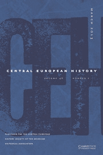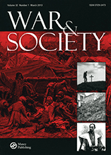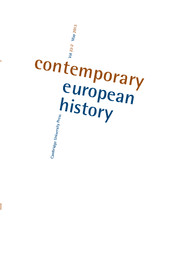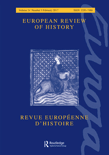
CENTRAL EUROPEAN HISTORY
Scope & Guideline
Illuminating the Past, Shaping the Future of Central Europe
Introduction
Aims and Scopes
- Interdisciplinary Approaches:
The journal adopts interdisciplinary methodologies, integrating perspectives from history, sociology, cultural studies, and political science to provide a comprehensive understanding of Central European historical phenomena. - Focus on Nationalism and Identity:
A core area of research is the exploration of nationalism, ethnic identity, and cultural memory, particularly in the context of the Austro-Hungarian Empire, Nazi Germany, and post-war Europe. - Social and Political Histories:
The journal emphasizes social history, examining the experiences of marginalized groups, including women, Jews, and ethnic minorities, within the broader political contexts of Central Europe. - Histories of Violence and Trauma:
There is a consistent focus on the histories of violence, trauma, and memory, particularly related to the Holocaust and World War II, analyzing their implications for contemporary society. - Cultural History and Representation:
The journal also delves into cultural history, investigating how cultural practices, artifacts, and representations shape and reflect historical narratives. - Transnational Perspectives:
'Central European History' encourages research that transcends national boundaries, highlighting transnational connections and the impact of globalization on historical developments.
Trending and Emerging
- Memory Studies:
There is a growing emphasis on memory studies, particularly how societies remember and interpret past traumas, including the Holocaust and World War II, showing increased interest in collective memory and its societal implications. - Gender and Sexuality Studies:
The journal has seen an upsurge in research focusing on gender and sexuality, exploring how these dimensions intersect with historical narratives and contribute to understanding identity in Central Europe. - Environmental History:
Emerging themes in environmental history are gaining traction, with studies examining the relationship between society and the environment in Central Europe, particularly in the context of industrialization and urbanization. - Transnational and Comparative Histories:
There is a rising trend towards transnational and comparative histories that explore connections between Central Europe and other regions, reflecting a broader understanding of historical processes. - Cultural Production and Representation:
The journal is increasingly focusing on the role of cultural production, including literature, art, and media, in shaping historical narratives and collective identities.
Declining or Waning
- Traditional Political History:
There is a noticeable decline in traditional political history topics, particularly those focusing solely on high politics and state institutions, as the journal increasingly favors social and cultural histories. - Colonial and Imperial Studies:
Research centered on colonial and imperial histories, particularly those outside the immediate context of Central Europe, has waned, reflecting a shift towards more localized and nuanced studies of Central European experiences. - Economic History:
The focus on economic history, especially in terms of macroeconomic analyses, has decreased, with a trend toward examining the socio-cultural implications of economic policies and practices instead.
Similar Journals

STUDI STORICI
Bridging Past and Present in Scholarly DiscourseSTUDI STORICI, published by CAROCCI EDITORE SPA, is a distinguished journal in the field of History, recognized for its contributions to historical scholarship since its inception in 1966. With an ISSN of 0039-3037 and an E-ISSN of 2036-458X, this journal is acclaimed for delving into various historical themes and methodologies, making notable influences in both academic research and public discourse. It holds a commendable Q2 ranking in the 2023 Scopus category for History, placing it in the top tier of historical research journals. The journal’s curated articles span a wide range of historical periods and contexts, providing critical insights and fostering scholarly dialogue among researchers, professionals, and students alike. Despite not being open access, STUDI STORICI remains an essential resource for anyone seeking to engage with the complexities of history and its implications in contemporary society. Based in Rome, Italy, at VIA SARDEGNA 50, 00187, it continues to uphold a rich legacy of excellence instrumental in shaping the field.

ZEITSCHRIFT FUR GESCHICHTSWISSENSCHAFT
Where Critical Discourse Meets Historical Inquiry.ZEITSCHRIFT FUR GESCHICHTSWISSENSCHAFT is a distinguished academic journal published by METROPOL-VERLAG, specializing in the field of History. Established in 1971, this scholarly journal has provided a platform for rigorous research and critical discourse on historical topics, serving a vital role in the advancement of historical methodology and scholarship. The journal holds a current category quartile ranking of Q3 in History for 2023, positioning it within the lower tier of highly regarded journals in its field, as evidenced by its Scopus rank of #1582/1760. Despite being a non-open access publication, the journal is committed to disseminating valuable historical insights and fostering academic exchange among researchers, professionals, and students. With its long-standing reputation and a commitment to high-quality historical research, ZEITSCHRIFT FUR GESCHICHTSWISSENSCHAFT remains an essential resource for those pursuing knowledge and understanding of the past.

War & Society
Exploring the Nexus of Conflict and CommunityWar & Society is a pivotal academic journal dedicated to exploring the intricate relationship between conflicts and societal dynamics, providing a vital platform for scholars and practitioners in the historical and social sciences. Published by Routledge Journals, Taylor & Francis Ltd, this journal boasts a rich legacy operating since 1983, with research disseminated across key periods, including converged issues up to 2024. Its notable ranking places it in the 3rd Quartile (Q3) of the History category for 2023, emphasizing its relevance within the academic community. With a Scopus Rank of #596 out of 1760 in the Arts and Humanities - History field, War & Society engages readers with high-quality studies that examine historical contexts, violence, and societal change. The journal does not currently offer open access options, ensuring a focused scholarly environment, while its contribution to historical analysis remains invaluable for researchers, professionals, and students alike interested in the multifaceted effects of war on society.

Revista Historia Autonoma
Advancing Knowledge in Autonomous Historical StudiesRevista Historia Autonoma, a prominent journal in the field of autonomous historical studies, is published by the ASOC HISTORIA AUTONOMA based in Madrid, Spain. Since its inception in 2012, this Open Access journal has offered a platform for the dissemination of research that explores the diverse histories and cultural narratives within autonomous regions. The journal aims to foster scholarly dialogue and innovation by providing researchers, professionals, and students access to high-quality articles that illuminate lesser-known historical contexts. With its commitment to accessibility, Revista Historia Autonoma plays a crucial role in advancing the study of regional histories, making it an essential resource for those engaged in historical research and scholarship.

Anos 90
Illuminating the Complexities of a Defining Decade.Anos 90 is a distinguished journal dedicated to the exploration of historical narratives and cultural phenomena, particularly within the context of Brazil during the tumultuous decade of the 1990s. Published by the Universidade Federal do Rio Grande do Sul as part of its Programa de Pós-Graduação em História, this open access journal has been a vital platform for scholars since 1993, encouraging the dissemination and discussion of historical research that contributes to the understanding of contemporary societal evolution. With an ISSN of 1983-201X and an E-ISSN of 0104-236X, the journal is committed to providing accessible scholarly content to a global audience, thus fostering collaborative research opportunities and academic dialogue. Despite being ranked in the fourth quartile for the History category as of 2023, Anos 90 remains an essential resource for researchers and students seeking in-depth insights into historical interpretation and analysis. The journal serves as a critical juncture for the academic community interested in delving into the complexities of a pivotal era in Brazilian history, making it a significant addition to the field of historical study.

Contemporary European History
Advancing Interdisciplinary Insights in European HistoryContemporary European History is a leading academic journal dedicated to the exploration of significant historical events across Europe from 1992 to the present, published by Cambridge University Press. As a Q1 rated journal in the field of History, it boasts a robust impact factor, reflecting its high citation frequency and prominence among scholars. The journal serves as an essential platform for researchers, professionals, and students interested in contemporary issues and trends affecting Europe, promoting interdisciplinary dialogue and the exchange of ideas. With its commitment to high-quality scholarship, Contemporary European History provides insightful analyses that shape our understanding of recent historical dynamics, making it a vital resource for anyone looking to delve into the complexities of modern European history.

Historia y Politica
Bridging the Gap Between Historical Events and Political ContextsHistoria y Política is a prestigious academic journal published by the CENTRO ESTUDIOS POLITICOS CONSTITUCIONALES in Spain, recognized for its in-depth exploration of historical and political dynamics. With an ISSN of 1575-0361 and E-ISSN 1989-063X, this journal holds a significant place in the academic community, categorizing itself within Q2 in History and Q3 in Sociology and Political Science as of 2023. Spanning published works from 1999 to 2024, it focuses on a diverse array of subjects related to historical phenomena and their political implications, appealing to researchers, professionals, and students seeking to understand the intricate connections between past events and contemporary political landscapes. The journal does not currently offer open access; however, its rigorous peer-review process ensures that each publication meets high scholarly standards. With Scopus ranking it in the 74th percentile for History and 32nd percentile for Sociology and Political Science, Historia y Política continues to contribute valuable insights and foster critical discussions in its fields of expertise.

Historisk Tidskrift
Diving into Diverse Historical Narratives.Historisk Tidskrift, published by the SVENSKA HISTORISKA FORENINGEN in Sweden, is a pivotal journal in the field of historical studies, holding an ISSN of 0345-469X. With a history dating back to 1973, this journal serves as a platform for disseminating significant research and discussions in the discipline of history. Although it currently operates under a traditional subscription model, the journal's contributions are invaluable, particularly as it seeks to engage with a wide array of historical narratives and methodologies. In the 2023 category rankings, Historisk Tidskrift is positioned in the fourth quartile for History, a testament to its ongoing relevance in scholarly discourse, whilst ranking #1224 out of 1760 in the Scopus database for Arts and Humanities - History. This makes it a crucial resource for historians, researchers, and students alike, dedicated to exploring and expanding the understanding of historical contexts and interpretations.

Journal of Belgian History-Revue Belge d Histoire Contemporaine-Belgisch Tijdschrift voor Nieuwste Geschiedenis
Advancing Scholarship in Belgian HistoryThe Journal of Belgian History-Revue Belge d'Histoire Contemporaine-Belgisch Tijdschrift voor Nieuwste Geschiedenis is a prominent academic publication dedicated to the exploration and analysis of contemporary Belgian history. Published by SOMA-CEGES, this journal serves as a vital resource for researchers, professionals, and students alike, providing a platform for scholarly discourse and the dissemination of innovative research in the field. Despite its historical significance, the journal faced a hiatus in its Scopus coverage from 2019, yet it retains a strong identity within the Arts and Humanities category, holding a Scopus rank of #1123 out of 1328, placing it in the 15th percentile. This underscores the opportunities for growth and impactful contributions within the journal's scope. By focusing on the intricacies of Belgian history, the journal encourages rigorous investigation and a deeper understanding of Belgium's past, making it an essential reference for anyone interested in European historical narratives.

European Review of History-Revue Europeenne d Histoire
Elevating Historical Scholarship for a Global AudienceEuropean Review of History-Revue Europeenne d'Histoire, published by Routledge Journals, Taylor & Francis Ltd, is a prestigious, peer-reviewed journal that has been a leading forum for scholarship in the field of history since its inception. With an impressive 2023 Q1 ranking in the History category and a Scopus Rank of #304 out of 1760, the journal attracts a diverse audience of researchers, professionals, and students eager to engage with cutting-edge historical analysis. The journal publishes articles that bridge various historiographical traditions and methodologies, encouraging interdisciplinary dialogue and showcasing research from a European perspective and beyond. While not an open-access journal, the European Review of History offers rich content catering to those seeking to expand their understanding of historical discourse and promote innovative scholarship. The journal's consistent commitment to quality and relevance ensures its vital role in shaping the future of historical studies.